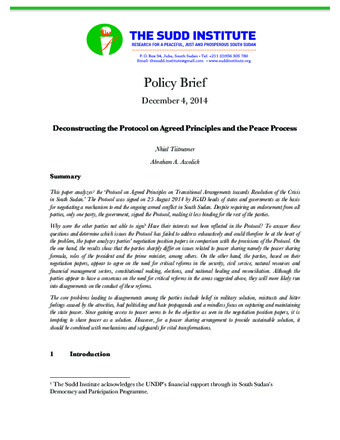Deconstructing the Protocol on Agreed Principles and the Peace Process

Authors: Abraham Awolich, Nhial Tiitmamer
Organization: The Sudd Institute
Type: Policy Briefs
Date: 04/12/2014
Publication Summary
This paper analyzes the ‘Protocol on Agreed Principles on Transitional Arrangements towards Resolution of the Crisis in South Sudan.’ The Protocol was signed on 25 August 2014 by IGAD heads of states and governments as the basis for negotiating a mechanism to end the ongoing armed conflict in South Sudan. Despite requiring an endorsement from all parties, only one party, the government, signed the Protocol, making it less binding for the rest of the parties.
Why were the other parties not able to sign? Have their interests not been reflected in the Protocol? To answer these questions and determine which issues the Protocol has failed to address exhaustively and could therefore be at the heart of the problem, the paper analyzes parties’ negotiation position papers in comparison with the provisions of the Protocol. On the one hand, the results show that the parties sharply differ on issues related to power sharing namely the power sharing formula, roles of the president and the prime minister, among others. On the other hand, the parties, based on their negotiation papers, appear to agree on the need for critical reforms in the security, civil service, natural resources and financial management sectors, constitutional making, elections, and national healing and reconciliation. Although the parties appear to have a consensus on the need for critical reforms in the areas suggested above, they will more likely run into disagreements on the conduct of these reforms.
The core problems leading to disagreements among the parties include belief in military solution, mistrusts and bitter feelings caused by the atrocities, bad politicking and hate propaganda and a mindless focus on capturing and maintaining the state power. Since gaining access to power seems to be the objective as seen in the negotiation position papers, it is tempting to share power as a solution. However, for a power sharing arrangement to provide sustainable solution, it should be combined with mechanisms and safeguards for vital transformations.
Abraham Awolich is the former Managing Director of the Sudd Institute. Awolich’s research has focused on management of development organizations working in conflict mitigation, governance and business management. Awolich is the co-founder of the Sudan Development Foundation and the former Executive Director of New Sudan Education Initiative (NESEI). Previous to joining the Sudd Institute, Awolich helped establish a secondary school in Yei and a medical clinic in Kalthok, Awerial County. Awolich has a Master’s Degree in Pubic Administration from the Maxwell School of Citizenship and Public Affairs at Syracuse University and Bachelor’s Degree from the University of Vermont in Anthropology and Business Administration. Awolich is a McNair Scholar and winner of the prestigious Samuel Huntington Public Service Award in 2006.
Nhial Tiitmamer has served as the Director of the Environment and Natural Resources Program at The Sudd Institute where he is currently on leave to work with United Nations in South Sudan (UNMISS). He has served as an Adjunct Assistant Professor at the University of Juba where he has taught Environmental Economics, Natural Resources Economics and Environmental Sociology. Between November 2021 and November 2022, Nhial worked as Senior Environment Associate with the United Nations High Commissioner for Refugees (UNHCR) in Juba. Before returning from Canada in 2013, Nhial worked at Arletta Environmental Consulting in Calgary and at University of Alberta’s Augustana Campus in Camrose in Alberta, Canada. Nhial’s research focusses on natural resources governance, environmental protection, climate change, and sustainable energy. He was awarded in May 2023 by the Board of Directors of The Sudd Institute with Research Impact Award for policy impacts. Nhial holds a B.A. in Environmental Studies with a minor in English Literature from the University of Alberta and an M.Sc. in Sustainable Energy Development from the University of Calgary in Alberta, Canada.
